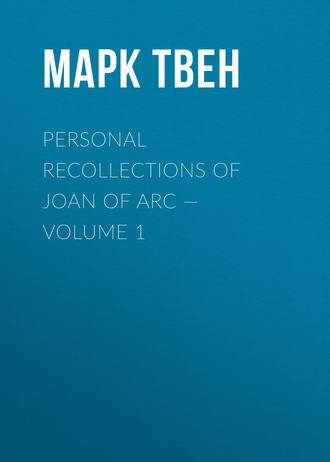
Марк Твен
Personal Recollections of Joan of Arc — Volume 1
Chapter 17 Sweet Fruit of Bitter Truth
WHEN WE got home, breakfast for us minor fry was waiting in our mess-room and the family honored us by coming in to eat it with us. The nice old treasurer, and in fact all three were flatteringly eager to hear about our adventures. Nobody asked the Paladin to begin, but he did begin, because now that his specially ordained and peculiar military rank set him above everybody on the personal staff but old D’Aulon, who didn’t eat with us, he didn’t care a farthing for the knights’ nobility no mine, but took precedence in the talk whenever it suited him, which was all the time, because he was born that way. He said:
“God be thanked, we found the army in admirable condition I think I have never seen a finer body of animals.”
“Animals!” said Miss Catherine.
“I will explain to you what he means,” said Noel. “He — ”
“I will trouble you not to trouble yourself to explain anything for me,” said the Paladin, loftily. “I have reason to think — ”
“That is his way,” said Noel; “always when he thinks he has reason to think, he thinks he does think, but this is an error. He didn’t see the army. I noticed him, and he didn’t see it. He was troubled by his old complaint.”
“What’s his old complaint?” Catherine asked.
“Prudence,” I said, seeing my chance to help.
But it was not a fortunate remark, for the Paladin said:
“It probably isn’t your turn to criticize people’s prudence — you who fall out of the saddle when a donkey brays.”
They all laughed, and I was ashamed of myself for my hasty smartness. I said:
“It isn’t quite fair for you to say I fell out on account of the donkey’s braying. It was emotion, just ordinary emotion.”
“Very well, if you want to call it that, I am not objecting. What would you call it, Sir Bertrand?”
“Well, it — well, whatever it was, it was excusable, I think. All of you have learned how to behave in hot hand-to-hand engagements, and you don’t need to be ashamed of your record in that matter; but to walk along in front of death, with one’s hands idle, and no noise, no music, and nothing going on, is a very trying situation. If I were you, De Conte, I would name the emotion; it’s nothing to be ashamed of.”
It was as straight and sensible a speech as ever I heard, and I was grateful for the opening it gave me; so I came out and said:
“It was fear — and thank you for the honest idea, too.”
“It was the cleanest and best way out,” said the old treasurer; “you’ve done well, my lad.”
That made me comfortable, and when Miss Catherine said, “It’s what I think, too,” I was grateful to myself for getting into that scrape.
Sir Jean de Metz said:
“We were all in a body together when the donkey brayed, and it was dismally still at the time. I don’t see how any young campaigner could escape some little touch of that emotion.”
He looked about him with a pleasant expression of inquiry on his good face, and as each pair of eyes in turn met his head they were in nodded a confession. Even the Paladin delivered his nod. That surprised everybody, and saved the Standard-Bearer’s credit. It was clever of him; nobody believed he could tell the truth that way without practice, or would tell that particular sort of a truth either with or without practice. I suppose he judged it would favorably impress the family. Then the old treasurer said:
“Passing the forts in that trying way required the same sort of nerve that a person must have when ghosts are about him in the dark, I should think. What does the Standard-Bearer think?”
“Well, I don’t quite know about that, sir. I’ve often thought I would like to see a ghost if I — ”
“Would you?” exclaimed the young lady. “We’ve got one! Would you try that one? Will you?”
She was so eager and pretty that the Paladin said straight out that he would; and then as none of the rest had bravery enough to expose the fear that was in him, one volunteered after the other with a prompt mouth and a sick heart till all were shipped for the voyage; then the girl clapped her hands in glee, and the parents were gratified, too, saying that the ghosts of their house had been a dread and a misery to them and their forebears for generations, and nobody had ever been found yet who was willing to confront them and find out what their trouble was, so that the family could heal it and content the poor specters and beguile them to tranquillity and peace.
Chapter 18 Joan’s First Battle-Field
ABOUT NOON I was chatting with Madame Boucher; nothing was going on, all was quiet, when Catherine Boucher suddenly entered in great excitement, and said:
“Fly, sir, fly! The Maid was doing in her chair in my room, when she sprang up and cried out, ‘French blood is flowing! — my arms, give me my arms!’ Her giant was on guard at the door, and he brought D’Aulon, who began to arm her, and I and the giant have been warning the staff. Fly! — and stay by her; and if there really is a battle, keep her out of it — don’t let her risk herself — there is no need — if the men know she is near and looking on, it is all that is necessary. Keep her out of the fight — don’t fail of this!”
I started on a run, saying, sarcastically — for I was always fond of sarcasm, and it was said that I had a most neat gift that way:
“Oh, yes, nothing easier than that — I’ll attend to it!”
At the furthest end of the house I met Joan, fully armed, hurrying toward the door, and she said:
“Ah, French blood is being spilt, and you did not tell me.”
“Indeed I did not know it,” I said; “there are no sounds of war; everything is quiet, your Excellency.”
“You will hear war-sounds enough in a moment,” she said, and was gone.
It was true. Before one could count five there broke upon the stillness the swelling rush and tramp of an approaching multitude of men and horses, with hoarse cries of command; and then out of the distance came the muffled deep boom! — boom-boom! — boom! of cannon, and straightway that rushing multitude was roaring by the house like a hurricane.
Our knights and all our staff came flying, armed, but with no horses ready, and we burst out after Joan in a body, the Paladin in the lead with the banner. The surging crowd was made up half of citizens and half of soldiers, and had no recognized leader. When Joan was seen a huzza went up, and she shouted:
“A horse — a horse!”
A dozen saddles were at her disposal in a moment. She mounted, a hundred people shouting:
“Way, there — way for the MAID OF ORLEANS!” The first time that that immortal name was ever uttered — and I, praise God, was there to hear it! The mass divided itself like the waters of the Red Sea, and down this lane Joan went skimming like a bird, crying, “Forward, French hearts — follow me!” and we came winging in her wake on the rest of the borrowed horses, the holy standard streaming above us, and the lane closing together in our rear.
This was a different thing from the ghastly march past the dismal bastilles. No, we felt fine, now, and all awhirl with enthusiasm. The explanation of this sudden uprising was this. The city and the little garrison, so long hopeless and afraid, had gone wild over Joan’s coming, and could no longer restrain their desire to get at the enemy; so, without orders from anybody, a few hundred soldiers and citizens had plunged out at the Burgundy gate on a sudden impulse and made a charge on one of Lord Talbot’s most formidable fortresses — St. Loup — and were getting the worst of it. The news of this had swept through the city and started this new crowd that we were with.
As we poured out at the gate we met a force bringing in the wounded from the front. The sight moved Joan, and she said:
“Ah, French blood; it makes my hair rise to see it!”
We were soon on the field, soon in the midst of the turmoil. Joan was seeing her first real battle, and so were we.
It was a battle in the open field; for the garrison of St. Loup had sallied confidently out to meet the attack, being used to victories when “witches” were not around. The sally had been reinforced by troops from the “Paris” bastille, and when we approached the French were getting whipped and were falling back. But when Joan came charging through the disorder with her banner displayed, crying “Forward, men — follow me!” there was a change; the French turned about and surged forward like a solid wave of the sea, and swept the English before them, hacking and slashing, and being hacked and slashed, in a way that was terrible to see.
In the field the Dwarf had no assignment; that is to say, he was not under orders to occupy any particular place, therefore he chose his place for himself, and went ahead of Joan and made a road for her. It was horrible to see the iron helmets fly into fragments under his dreadful ax. He called it cracking nuts, and it looked like that. He made a good road, and paved it well with flesh and iron. Joan and the rest of us followed it so briskly that we outspeeded our forces and had the English behind us as well as before. The knights commanded us to face outward around Joan, which we did, and then there was work done that was fine to see. One was obliged to respect the Paladin, now. Being right under Joan’s exalting and transforming eye, he forgot his native prudence, he forgot his diffidence in the presence of danger, he forgot what fear was, and he never laid about him in his imaginary battles in a more tremendous way that he did in this real one; and wherever he struck there was an enemy the less.
We were in that close place only a few minutes; then our forces to the rear broke through with a great shout and joined us, and then the English fought a retreating fight, but in a fine and gallant way, and we drove them to their fortress foot by foot, they facing us all the time, and their reserves on the walls raining showers of arrows, cross-bow bolts, and stone cannon-balls upon us.
The bulk of the enemy got safely within the works and left us outside with piles of French and English dead and wounded for company — a sickening sight, an awful sight to us youngsters, for our little ambush fights in February had been in the night, and the blood and the mutilations and the dead faces were mercifully dim, whereas we saw these things now for the first time in all their naked ghastliness.
Now arrived Dunois from the city, and plunged through the battle on his foam-flecked horse and galloped up to Joan, saluting, and uttering handsome compliments as he came. He waved his hand toward the distant walls of the city, where a multitude of flags were flaunting gaily in the wind, and said the populace were up there observing her fortunate performance and rejoicing over it, and added that she and the forces would have a great reception now.
“Now? Hardly now, Bastard. Not yet!”
“Why not yet? Is there more to be done?”
“More, Bastard? We have but begun! We will take this fortress.”
“Ah, you can’t be serious! We can’t take this place; let me urge you not to make the attempt; it is too desperate. Let me order the forces back.”
Joan’s heart was overflowing with the joys and enthusiasms of war, and it made her impatient to hear such talk. She cried out:
“Bastard, Bastard, will ye play always with these English? Now verily I tell you we will not budge until this place is ours. We will carry it by storm. Sound the charge!”
“Ah, my General — ”
“Waste no more time, man — let the bugles sound the assault!” and we saw that strange deep light in her eye which we named the battle-light, and learned to know so well in later fields.
The martial notes pealed out, the troops answered with a yell, and down they came against that formidable work, whose outlines were lost in its own cannon-smoke, and whose sides were spouting flame and thunder.
We suffered repulse after repulse, but Joan was here and there and everywhere encouraging the men, and she kept them to their work. During three hours the tide ebbed and flowed, flowed and ebbed; but at last La Hire, who was now come, made a final and resistless charge, and the bastille St. Loup was ours. We gutted it, taking all its stores and artillery, and then destroyed it.
When all our host was shouting itself hoarse with rejoicings, and there went up a cry for the General, for they wanted to praise her and glorify her and do her homage for her victory, we had trouble to find her; and when we did find her, she was off by herself, sitting among a ruck of corpses, with her face in her hands, crying — for she was a young girl, you know, and her hero heart was a young girl’s heart too, with the pity and the tenderness that are natural to it. She was thinking of the mothers of those dead friends and enemies.
Among the prisoners were a number of priests, and Joan took these under her protection and saved their lives. It was urged that they were most probably combatants in disguise, but she said:
“As to that, how can any tell? They wear the livery of God, and if even one of these wears it rightfully, surely it were better that all the guilty should escape than that we have upon our hands the blood of that innocent man. I will lodge them where I lodge, and feed them, and sent them away in safety.”
We marched back to the city with our crop of cannon and prisoners on view and our banners displayed. Here was the first substantial bit of war-work the imprisoned people had seen in the seven months that the siege had endured, the first chance they had had to rejoice over a French exploit. You may guess that they made good use of it. They and the bells went mad. Joan was their darling now, and the press of people struggling and shouldering each other to get a glimpse of her was so great that we could hardly push our way through the streets at all. Her new name had gone all about, and was on everybody’s lips. The Holy Maid of Vaucouleurs was a forgotten title; the city had claimed her for its own, and she was the MAID OF ORLEANS now. It is a happiness to me to remember that I heard that name the first time it was ever uttered. Between that first utterance and the last time it will be uttered on this earth — ah, think how many moldering ages will lie in that gap!
The Boucher family welcomed her back as if she had been a child of the house, and saved from death against all hope or probability. They chided her for going into the battle and exposing herself to danger during all those hours. They could not realize that she had meant to carry her warriorship so far, and asked her if it had really been her purpose to go right into the turmoil of the fight, or hadn’t she got swept into it by accident and the rush of the troops? They begged her to be more careful another time. It was good advice, maybe, but it fell upon pretty unfruitful soil.
Chapter 19 We Burst In Upon Ghosts
BEING WORN out with the long fight, we all slept the rest of the afternoon away and two or three hours into the night. Then we got up refreshed, and had supper. As for me, I could have been willing to let the matter of the ghost drop; and the others were of a like mind, no doubt, for they talked diligently of the battle and said nothing of that other thing. And indeed it was fine and stirring to hear the Paladin rehearse his deeds and see him pile his dead, fifteen here, eighteen there, and thirty-five yonder; but this only postponed the trouble; it could not do more. He could not go on forever; when he had carried the bastille by assault and eaten up the garrison there was nothing for it but to stop, unless Catherine Boucher would give him a new start and have it all done over again — as we hoped she would, this time — but she was otherwise minded. As soon as there was a good opening and a fair chance, she brought up her unwelcome subject, and we faced it the best we could.
We followed her and her parents to the haunted room at eleven o’clock, with candles, and also with torches to place in the sockets on the walls. It was a big house, with very thick walls, and this room was in a remote part of it which had been left unoccupied for nobody knew how many years, because of its evil repute.
This was a large room, like a salon, and had a big table in it of enduring oak and well preserved; but the chair were worm-eaten and the tapestry on the walls was rotten and discolored by age. The dusty cobwebs under the ceiling had the look of not having had any business for a century.
Catherine said:
“Tradition says that these ghosts have never been seen — they have merely been heard. It is plain that this room was once larger than it is now, and that the wall at this end was built in some bygone time to make and fence off a narrow room there. There is no communication anywhere with that narrow room, and if it exists — and of that there is no reasonable doubt — it has no light and no air, but is an absolute dungeon. Wait where you are, and take note of what happens.”
That was all. Then she and her parents left us. When their footfalls had died out in the distance down the empty stone corridors an uncanny silence and solemnity ensued which was dismaler to me than the mute march past the bastilles. We sat looking vacantly at each other, and it was easy to see that no one there was comfortable. The longer we sat so, the more deadly still that stillness got to be; and when the wind began to moan around the house presently, it made me sick and miserable, and I wished I had been brave enough to be a coward this time, for indeed it is no proper shame to be afraid of ghosts, seeing how helpless the living are in their hands. And then these ghosts were invisible, which made the matter the worse, as it seemed to me. They might be in the room with us at that moment — we could not know. I felt airy touches on my shoulders and my hair, and I shrank from them and cringed, and was not ashamed to show this fear, for I saw the others doing the like, and knew that they were feeling those faint contacts too. As this went on — oh, eternities it seemed, the time dragged so drearily — all those faces became as wax, and I seemed sitting with a congress of the dead.
At last, faint and far and weird and slow, came a “boom! — boom! — boom!” — a distant bell tolling midnight. When the last stroke died, that depressing stillness followed again, and as before I was staring at those waxen faces and feeling those airy touches on my hair and my shoulders once more.
One minute — two minutes — three minutes of this, then we heard a long deep groan, and everybody sprang up and stood, with his legs quaking. It came from that little dungeon. There was a pause, then we herd muffled sobbings, mixed with pitiful ejaculations. Then there was a second voice, low and not distinct, and the one seemed trying to comfort the other; and so the two voices went on, with moanings, and soft sobbings, and, ah, the tones were so full of compassion and sorry and despair! Indeed, it made one’s heart sore to hear it.
But those sounds were so real and so human and so moving that the idea of ghosts passed straight out of our minds, and Sir Jean de Metz spoke out and said:
“Come! we will smash that wall and set those poor captives free. Here, with your ax!”
The Dwarf jumped forward, swinging his great ax with both hands, and others sprang for torches and brought them.
Bang! — whang! — slam! — smash went the ancient bricks, and there was a hole an ox could pass through. We plunged within and held up the torches.
Nothing there but vacancy! On the floor lay a rusty sword and a rotten fan.
Now you know all that I know. Take the pathetic relics, and weave about them the romance of the dungeon’s long-vanished inmates as best you can.






